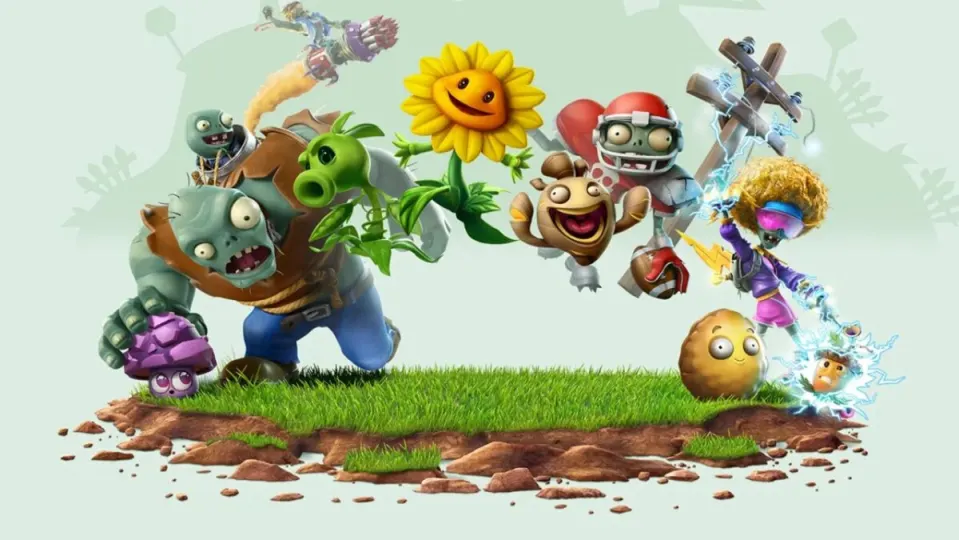Surely you remember the first time you played Plants Vs Zombies: a game as simple in appearance as it was complex to master, which relied on the player’s ability to plant the right sunflowers and place the perfect plants and guessing strategies that ended on a high note, with one of the biggest hits in the history of video games (only second only to Portal’s Still Alive). But 14 years have passed since that first game and since then we haven’t had much news from PopCap, its developers. So… What has become of them?
Sexy Action Cool
Year 2000, Seattle. Jason Kapalka founds Sexy Action Cool, his own video game company, together with John Vechey and Brian Fiete. The idea was to create innovative video games that they were passionate about, even if they first had to make cheap but attention-grabbing stuff to make easy money. Their first attempt was Foxy Poker, which was about, you guessed it, a game of strip poker.

Sadly for them, the game did not succeed (for whatever reason) and in fact it is currently lost, but the fame they did not get then was achieved with their next release, the famous Bejeweled (formerly known as Diamond Mine), which at that time was played directly from the Internet. Between Diamond Mine and Bejeweled it took four months of development and they achieved more than ten million units sold between all the platforms where it was adapted, from Blackberry to… the first iPod.
Sexy Action Cool had already changed its name to PopCap, and its success was such that it even acquired a casual games company and expanded outside Seattle: they opened a company in Dublin and planned, between sequels to Bejeweled and other casual video games (such as Peggle and Bookworm), what they had always wanted to do. That is, a completely original title that would change the rules of the game.
Practicing gardening
In 2001, George Fan, a Californian developer, created a game called Insaniquarium that mixed pet simulation, strategy, action and puzzles. Years later, he was still kicking around the idea of making a sequel, which eventually led to a tower defense between plants and zombies. The PopCap team, passionate about the subject, took three and a half years to put the game together before launching it on May 5, 2009. A decade after its founding, they had finally achieved what they were looking for: a more or less original, epoch-making hit.
Plants Vs Zombies (which was going to be called Lawn of the Dead until George A. Romero expressly forbade it) took ideas from Warcraft III, Magic The Gathering and Swiss Family Robinson, but gave them the perfect twist to create a little adventure game with no micropayments, the old-fashioned way. The game came to iPhone, Android and consoles over the years and became PopCap’s fastest selling game ever.

To give you an idea: in just nine days, sales on iOS exceeded one million dollars, so PopCap had an incredible future ahead of it. And then, as in all horror stories, along came the big bad wolf. In this case, Electronic Arts, which bought the company on July 12, 2011 for $560 million. And when you’re bought by someone like Electronic Arts, they want immediate results: the beginning of the end.
More plants, more zombies
Since its purchase, PopCap has not released a single original game: only sequels to Peggle, Zuma, Bejeweled and, of course, Plants Vs Zombies. In August 2012, in fact, they announced that they would lay off fifty employees to focus on developing free-to-play games with micropayments. Said and done: in 2013, Plants Vs Zombies 2: It’s About Time was fun enough to ignore the fact that every so often you were pushed to buy power-ups and novelties.

The sequel was a bigger hit than the original: it sold 25 million units in one month, setting the franchise up for success. But greed is dangerous, and after PopCap Vancouver took a chance (and succeeded) with the two great Garden Warfare games, it was time to go back to mobile: Plants vs Zombies Heroes launched in 2016 with the ability to play on any of the two teams and with a system similar to that of Hearthstone… And with increasingly annoying and intrusive ads and micropayments.
And since then, beyond another console game similar to Garden Warfare, nothing. Plants vs Zombies 3 remains an eternal promise that they’ve been developing for years and years doing something they hadn’t done up to that point: disregard EA’s pleas and listen, instead, to the fans. In July 2019, a pre-alpha was released on Android. Then, in October 2020, there was a worldwide release, but it was so criticized for continuous micropayments that it was withdrawn a month later. In 2021 there was another attempt, but so far there hasn’t been an official release… And EA is starting to get nervous.

With a broken management team, a community of fans demanding a return to the basics of the first game, a canceled animated film, and several canceled projects, the question is in the air: will they, like Rovio, manage to stay afloat, or before even from the third party PopCap has already died… but no one has warned them?


